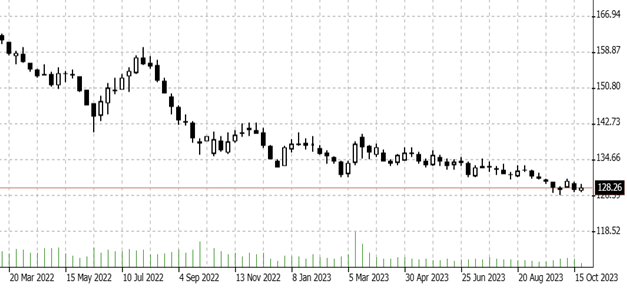

25.10.2023 – Tomorrow’s meeting of the European Central Bank (ECB) is likely to be particularly exciting. Most experts expect a pause in tightening for the time being. In the case of German government bonds, the bears continue to call the shots.
Handelsblatt” is certain: The first interest rate pause since the summer of 2022 is probably imminent in the euro zone. According to the newspaper, most economists believe this. This will make ten-year Bunds, for example, less attractive, here the weekly chart.

Spurce: Bernstein Bank GmbH
After ten consecutive interest rate hikes, the ECB is likely to put the brakes on Athens, of all places. Greece in particular, but also Italy, are groaning under the higher interest rates, which make it more expensive to take on debt. The key interest rate in Euroland is 4.5 percent, while the deposit rate for banks’ surplus capital is 4.0 percent.
Slowing inflation is giving monetary watchdogs some breathing room: In September, consumer prices in the eurozone rose 4.3 percent, the slowest pace in two years. Moreover, the eurozone is mired in a mild recession. In addition to interest rates, the exciting question is what the ECB will do about buying up financial securities.
Escalation postponed
Interestingly, despite the Middle East crisis, there is currently no flight into the usual safe havens. This is also due to the fact that an escalation is probably off the table for the time being. The U.S. is stabbing Israel in the arm, delaying a ground offensive in Gaza, preventing the destruction of Hamas and at the same time arranging aid deliveries to Gaza via Egypt – nobody knows what exactly is in the trucks that enter via Rafah. Washington also denies Iran’s more than obvious complicity in the 07/10 massacres, continuing the Obama administrations appeasement policy. Further, Joe Biden, speaking to reporters on the flight back from Israel, cast doubt on U.S. intervention in the event of a Hezbollah attack on Israel. The blocking embrace of the supposed friend of Israel has been nicely analyzed by the “Tablet Magazine” in the article “Biden’s Three Nos”.
Bond market sales
This is not the only reason why bonds are selling off, and this is also true in the U.S. Recently, the yield on the ten-year U.S. government bond exceeded the five percent mark for the first time since 2007. Experts cite the growing mistrust among investors of the escalating national debt of the United States as the reason for this. Just as an aside: Europe is also heavily indebted.
We add: Perhaps a sell-off of U.S. bonds and of German bunds in Asia is going on behind the scenes. The first suspect for this would be China, the second Japan. Beijing needs to support the domestic economy and, above all, prevent a collapse in the real estate market. Tokyo needs money to buy Japan bonds to maintain its zero interest rate policy.
So if you are involved in the bond market and forex trading, you should keep a very close eye on the real-time news tomorrow. If the ECB really takes the interest rate pause, it should tend to go south with the Bund and EURUSD – if no other news hit the market. If a new rate hike comes, it will be turbulent in the market. Whether long or short – Bernstein Bank wishes successful trades and investments!
________________________________________________________________________________________________________________________________________________________________________________________________
The content of this publication is for general information purposes only. In this context, it is neither an individual investment recommendation or advice nor an offer to purchase or sell securities or other financial products. The content in question and all the information contained therein do not in any way replace individual investor- or investment-oriented advice. No reliable forecast or indication for the future is possible with respect to any presentation or information on the present or past performance of the relevant underlying assets. All information and data presented in this publication are based on reliable sources. However, Bernstein Bank does not guarantee that the information and data contained in this publication is up-to-date, correct and complete. Securities traded on the financial markets are subject to price fluctuations. A contract for difference (CFD) is also a financial instrument with leverage effect. Against this backdrop, CFD trading involves a high risk up to the point of total loss and may not be suitable for all investors. Therefore, make sure that you have fully understood all the correlating risks. If necessary, ask for independent advice. CFDs are complex instruments and are associated with the high risk of losing money quickly because of the leverage effect. 68% of retail investor accounts lose money trading CFD with this provider. You should consider whether you understand how CFD work and whether you can afford to take the high risk of losing your money.7
